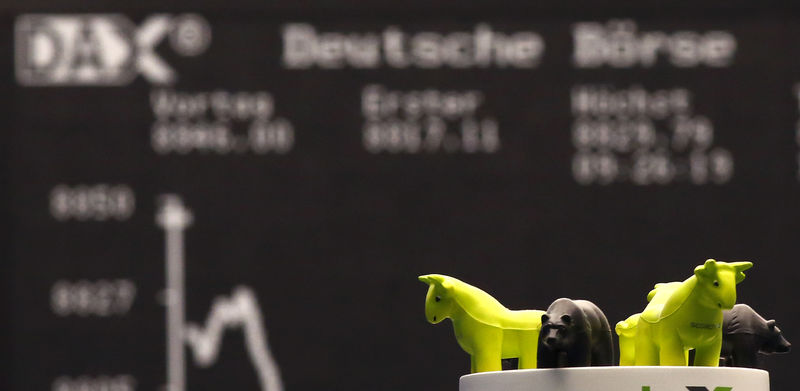European stocks mixed; ASML shines ahead of eurozone growth data
European stock markets traded in a mixed fashion Thursday, with investors digesting a deluge of corporate earnings as well as regional growth and employment data.
At 03:05 ET (08:05 GMT), the DAX index in Germany traded 0.6% higher and the CAC 40 in France rose 0.2%, while the FTSE 100 in the U.K. dropped 0.1%. Eurozone growth data in spotlight
European equities are struggling to post gains as the week draws to an end, weighed by concerns of a potential trade war with the new Donald Trump-led US administration as the eurozone struggles to register any major economic growth.
In focus in Europe Thursday will be the release of the eurozone's second estimate for gross domestic product growth and third-quarter flash employment data.
Preliminary figures in October showed the bloc grew faster than market watchers expected in the third quarter from the previous three months, but quarterly growth of 0.4% showed the eurozone economy remained fragile, with the largest component - the German economy - particularly weak.
U.S. consumer inflation data - released on Wednesday - read in line with expectations for October, but still showed inflation remained sticky.
While the reading still spurred bets on a December interest rate cut by the Federal Reserve, the longer-term rate outlook grew more uncertain, especially in the face of potentially inflationary policies under Trump. ASML sees growing sales
Thursday is another busy day of corporate news in Europe.
ASML (AS:ASML ) stock rose 3% after Europe's largest tech firm said it expects sales to grow by 8% to 14% over the coming five years, as a boom in AI fuels strong demand for its most advanced tools.
Burberry (LON:BRBY ) stock rose 6% after new CEO Joshua Schulman unveiled his strategy to revive the struggling luxury fashion house, even as it reported a half-year operating loss.
Aviva (LON:AV ) stock rose almost 4% after the British insurer posted a 15% rise in general insurance gross written premiums for the first nine months of the year, adding that it was confident of meeting group targets. Crude prices hit by demand concerns
Oil prices fell Thursday, weighed down by concerns surrounding global demand growth as well as higher production.
By 03:05 ET, the Brent contract dropped 0.1% to $72.22 per barrel, while U.S. crude futures (WTI) traded 0.2% lower at $68.33 per barrel.
The Organization of Petroleum Exporting Countries cut its forecast for world oil demand growth in both 2024 and 2025 earlier in the week, mainly on concerns about China’s demand, and the International Energy Agency is likely to follow suit when it publishes its monthly report later in the session.
Meanwhile, the US Energy Information Administration slightly raised its expectation of US oil output this year, while also increasing its global oil output forecast for 2024.
The EIA publishes its weekly crude oil and product stockpile data later in the session, a day later than usual following Monday’s Veterans’ Day holiday in the US.
Source: Investing.com
